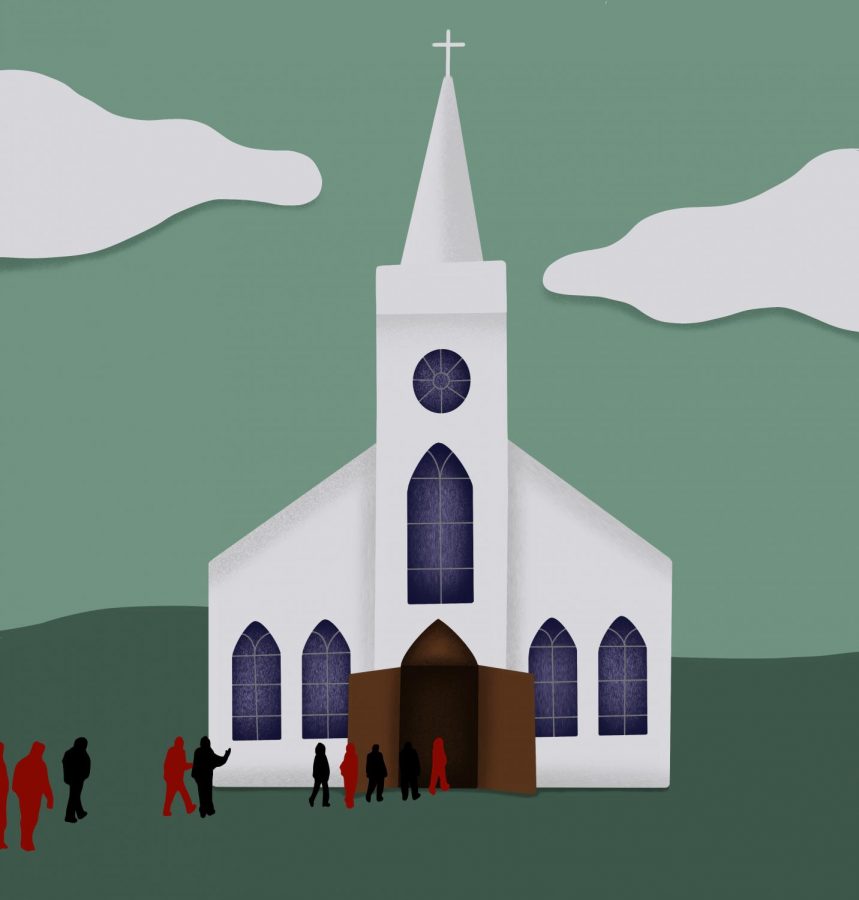Editorial | Coronavirus religious exemptions create public health hazard
Apr 9, 2020
As COVID-19 cases continue to augment across the country, around 95% of Americans are now under stay-at-home orders. This crackdown on social gathering didn’t happen overnight: it slowly rose as skeptical governors couldn’t deny the gravitas of the epidemic any longer.
Since these orders have been in effect, health officials have been quick to criticize what they have seen: Americans are not conducive to social distancing. Despite fines or other punitive measures, Americans have frequently and flagrantly disobeyed social distancing guidelines. College students party on beaches, individuals continue shaking hands and others capitalize on a vague definition of “essential” travel offered by the state. Poor commitment to social distancing, as previously illustrated, has only exacerbated the plague.
Size limits on social gatherings have been recommended by the president and issued by state governments, often placing a cap on 10 people gathered for any one event.
After governors equivocated on issuing stay-at-home orders, many added an ostensibly innocuous but highly contentious caveat: places of worship.
With or without an exemption, many churches around the country still insisted on assembling. Some claimed to be an “essential service” which meant they must stay open, while others simply accepted the punishment and perversely persisted.
Get The Daily Illini in your inbox!
Places of worship should be recognized as hotbeds for the spread of disease. In some churches, the same cup is used for all persons receiving communion. A lot of churches clasp hands of neighbors during prayer. The same religious texts and door handles will have been touched by the masses.
And although these people are making their own choice to attend a service with crowds of worshippers, unless the attendees are all committed to a strict two-week quarantine, their choice affects others not in attendance who did not choose to make the same poor decision. Any elder, immunocompromised person or essential worker they contact directly or indirectly is now put at risk.
Florida governor Ron DeSantis, who defiantly refused to issue a stay-at-home order while coronavirus cases soared in his state, swiftly designated religious services as “essential” after a Florida pastor was arrested for disregarding the stay-at-home order to hold a service.
Governor DeSantis, along with others encouraging live religious ceremonies, should face criticism. Many of these congregations are demonstrating bad behavior. When the state forgives that bad behavior, it undermines the credibility of its own mitigation efforts. The government should not expect to see the containment of the disease when it looks the other way for large religious gatherings. Needless deaths will accrue because of religious exemptions that understate the severity of COVID-19 and prioritize live church services before a live congregation.
On April 12, Christians will observe Easter. Local governments disbanding live church gatherings aren’t disavowing religiosity, but rather demanding other means to fulfilling spiritual needs that may pose a minor inconvenience to those acquiescing.
Countless churches have obliged. While some churches have recklessly converted into a public health hazard, others have set a good example by taking steps to keep their congregations safe. Certain churches have turned to online service, drive-in service or even drive-thru communion and palms.
Nationally, the spotlight has shined on American churches. But other religious centers, such as mosques and synagogues have similarly crafted innovative methods for maintaining religious practices while operating within the bounds of the law, even in their religious holiday seasons.
These stay-at-home orders do not mean extinguishing fellowship within a place of worship. It just means getting more creative. If one cannot be bothered to temporarily accept an alternative church service, it isn’t about reverence or devotion, it is about a dangerous pertinacity. Arrested religious leaders are not martyrs, they are irresponsible.
For those on campus and religiously inclined, some churches have listed online service times and other alternatives on their websites, like St. John’s Catholic Newman Center or Community United Church of Christ.
Although spiritualism of all kinds can be communal, it is also personal to each individual. If it cannot be done at home, one should ask his or her place of worship to adhere to the guidelines and make alternate arrangements if they haven’t already.
Religious exemptions set a poor example of the social distancing America requires right now. In order to effectively curb the incredibly infectious coronavirus, state governments must implement strict direction and everyone must comply, no exceptions. The government, like the churches they accommodate, must truly practice what they preach.






